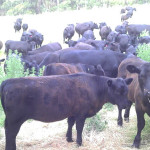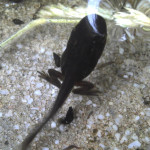Sub-shift or self-annihilise
Feb 06
 I had to fix a cattle trough recently. Some sediment or rust had clogged up the float valve where the water comes in, so it needed to be taken apart and cleaned. I’d opened a gate to allow the cattle access to another trough, but they still weren’t happy, and let me know in no uncertain terms that the water level was too low for their comfort, gathering around and hollering as I worked.
I had to fix a cattle trough recently. Some sediment or rust had clogged up the float valve where the water comes in, so it needed to be taken apart and cleaned. I’d opened a gate to allow the cattle access to another trough, but they still weren’t happy, and let me know in no uncertain terms that the water level was too low for their comfort, gathering around and hollering as I worked.
 The tadpoles in the trough, on the other hand, looked perfectly happy. I’m not an expert at recognising tadpole smiles, but they looked to be going about their business as usual, and an advanced one with legs even climbed out, checked out the world beyond the rim of the trough, decided that it may not be the best time to hit the road, and turned around and jumped back in.
The tadpoles in the trough, on the other hand, looked perfectly happy. I’m not an expert at recognising tadpole smiles, but they looked to be going about their business as usual, and an advanced one with legs even climbed out, checked out the world beyond the rim of the trough, decided that it may not be the best time to hit the road, and turned around and jumped back in.
It reminded me of the (maybe true, maybe not) anecdote of boiling frogs – if you pop a frog into cool water and increase the heat gradually, you’ll eventually get the water boiling and kill the frog without it registering what’s going on. In this case, it was about scale and perspective too. For the cattle, that trough represented imminent catastrophe – of which they were acutely aware – while for the tadpoles, it was good enough – even though they may only have had a few more days before the water evaporated.
Everywhere I look lately I’m struck by some kind of parallel of these, or similar, principles. And it leaves me worrying that we’re on the brink of catastrophe. Apparently worry is counter-productive – at least so I’ve heard from a number of experts, from psychologists to Jesus – but I’m thinking a bit of worry is not a bad thing.
Because Jesus wasn’t an ecologist
Look at the birds of the air, for they neither sow nor reap nor gather into barns; yet your heavenly Father feeds them. Which of you by worrying can add one cubit to his stature? (Matthew 6:26-7)
It’s a nice sentiment which, taken with the verses that follow about not worrying about day-to-day needs, can put a different light on our overly materialistic tendencies. But it’s also very ironic from a modern viewpoint: birds do sow and reap, in a simple fashion; some birds do gather into ‘barns’, and; one reason bird populations are so vulnerable is exactly because most don’t store up their food. That is, lots of birds die because, actually, no, they’re not being fed.
And most of us are actually quite a lot like birds. Perhaps worse, in terms of vulnerability to food scarcity. How close to self-sufficient are we, once the pantry’s empty? At least birds can recognise food in its naturally-occuring form.
Take a couple of steps further back in the production process and consider how self-sufficient your primary producers are. Here on the farm we reap and gather into barns, but mostly for our livestock (i.e. your steak). And we’re so damn clever that we can complete the whole process without getting off our backsides; a tractor and mower cuts the grass, a different tractor and rake rakes the grass, another tractor and baler bales the hay, a tractor loads the hay onto a truck, that tractor also unloads the hay from a truck and passes it to another different tractor which stacks it in the barn. Then, in winter, a tractor unstacks the bales and another tractor and feeder unwinds the bales in the paddock to feed the cattle.

Just shy of 200 of these in the sheds this season. Plenty of fodder for the cattle, provided we’ve got the diesel to get it to them…
Up until 10 or 15 years ago, the bales were small enough to handle by hand, and we did most of the carting and stacking and feeding by hand. Carting and stacking them was horrid, sweaty, dusty, itchy, back-breaking and hernia-inducing work (as a teenager, a next door neighbour once waxed lyrical about how much she loved the hay season; I really thought she must’ve been insane until I realised she was referring to the distance-induced sense of romance of watching it happen from her verandah, like some old english painting come to life) but at least they were manageable. These days we cannot physically lift a bale without a tractor. In fact, with the manpower of the farm’s entire workforce, we wouldn’t manage to lift one. We’d be able to shuffle it around and manouvre it, but without an internal combustion engine doing some work somewhere, the cattle wouldn’t get fed.
But the cattle don’t know that. They just know when their water is low. They also don’t know that we’ve artificially elevated the ‘carrying capacity’ of our particular bunch of paddocks through our management of the growing season abundance, to a population level it would never sustain naturally. In fact, most people eating the steak these days probably don’t know that either. That is pretty much the definition of agriculture – manipulating things to get a better return than you would naturally. And it’s served us well in the past – civilisation would’ve been a difficult project without agriculture. But we’ve come too far, surely.
Self-annihilisation?
It seems we’re almost addicted to convenience. The sense that comes to mind when I think of the situation is something like a picture of civilisation standing on top of a Jenga tower, and every so often someone climbs down and pulls out a bottom piece, climbs back up on top, and fashions that piece into some object of convenience to furnish their living space. “Unsustainable” doesn’t really evoke the level of importance and short-sightedness inherent in such a picture. I’ve been toying with the term “self-annihilisation”, meaning “self-destruction through specialisation”. Specialisation, in this sense, means the exact opposite of self-sufficiency; we’ve made ourselves reliant on other, specialised networks for our existence, because we are only capable of filling one or two specialised roles ourselves. Efforts such as this one – improving the shelf life of food – which on the surface may seem to be addressing the problems, actually present to me as another such case of pulling out a piece of the foundation and fashioning it into an item of convenience, and a case which will have adjunct outcomes of similar nature about which, until they’re realised, we can only speculate (for example, we could speculate that longer shelf life may provide another opportunity for cost-cutting, wherein the frequency with which trucks haul food may decrease, which could mean fewer, more heavily-laden trucks are required, which could mean fewer trucks in service over time, which could mean fewer trucks to haul food in an emergency).
Such matters seem to be the default ponderings to which my mind returns as I engage in an otherwise mind-numbing activity on the farm, like driving up and down rows of crops all day (on a diesel-eating tractor), or around and around in circles in a paddock (on a diesel-eating tractor). I try to think of more sustainable ways of doing things, but after thinking through all the practicalities of managing things on the ground and getting your goods from A to B, I come up against the fact that where economies of scale are concerned, sustainability is usually just a marketing term rather than a reality. I usually arrive at the conclusion that we not only have to localise, we have to scale down. Again, a new term seems called-for; “downshifting” is one thing, but I think we might need to go closer to “subshifting” – scale back closer to the point of subsistence living. And I believe that’s the state to which a large part of civilised humanity will return in the not too distant future – by choice or, much more likely, by circumstances beyond our control.
Whether it’s really as dire as the term self-annihilisation suggests, I guess only time will tell, but it does seem as though we are ‘painting ourselves into a corner’. But it’s hard to tell. The internet was designed as a military project to eliminate single-point-sensitivity, and has rather ironically become a single point of sensitivity for communication, commerce, information storage and so forth. If it goes down, we’re in trouble. But that’s the thing… it’s not really an “it” at all; if your ADSL phone line goes down, you can still connect with your mobile phone, or with your computer by turning your mobile phone into a wifi hotspot. Our systems – pretty much all of them – do have some degree of elasticity, resilience and redundancy (in the good sense). Having just experienced the loss of a market due to a single-point-sensitivity on the farm, I know that life goes on; the agricultural sector barely registers a ripple for the loss, and even in cases where the fallout would be orders of magnitude more extreme, the ripples and splashes will eventually come to rest and be swallowed up over time, and economic operations will resume in some form or another. The same is true for the internet, and all the other systems we’ve constructed, be they economic, social, logistical, or any other. There’s a big, thick, fuzzy grey line between the kinds of events that would cause small scale inconvenience and those that would certainly cause large scale suffering (just for kicks, consider the Carrington Event). I don’t know where that line is, but I have no doubt that our efforts in specialisation are contributing to pushing us to being on the trouble side.
Ancient wisdoms
Unlike Jesus’ reassurance that the birds are fed, this is one passage in the Bible that has an ominous power for me, where God pronounces the ground cursed after the Fall:
Cursed is the ground because of you; in toil you will eat of it all the days of your life. Both thorns and thistles it shall grow for you… by the sweat of your face you will eat bread…
We’ve made a good fist of escaping the hard labour promised by that curse, but I fear the pendulum reached its peak some time ago.
As to what to do while it swings back, well, I’ve often wondered what a subshifting community might look like. Or perhaps somewhere between downshifting and subshifting. Some other reading has introduced me to this book, which I think would be well worth a read.
